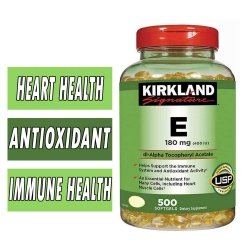Vitamin E at Lowest Prices
What is Vitamin E?
Vitamin E is a fat soluble vitamin with distinctive antioxidants properties. These properties benefit our bodies in numerous ways, such as treating and preventing diseases of the heart and blood vessels, such as chest pains or high blood pressure. But the benefits don't end there, it also plays a role in preventing free radical damage to specific fats in the body that are critical for your health and naturally slows aging. Due to it being fat soluble, it is best to supplement with food. Vitamin E is actually a complex of 8 chemicals (alpha-, beta-, gamma-, and delta-tocopherol and alpha-, beta-, gamma-, and delta-tocotrienol). Alpha-tocopherol is the only form that is recognized to meet human needs. The recommended daily allowance varies per age group.
...Children:
- 1–3 years: 6 mg/day (9 IU)
- 4–8 years: 7 mg/day (10.4 IU)
- 9–13 years: 11 mg/day (16.4 IU)
Females:
- 14 years and up: 15 mg/day (22.4 IU)
- Pregnant: 15 mg/day (22.4 IU)
- Breast-feeding: 19 mg/day (28.5 IU)
Males:
- 14 years and up: 15 mg/day (22.4 IU)
Where Can I get It?
Vitamin E is found only in plant foods, including certain oils, nuts, grains, fruits and wheat germ. It’s also available as a supplement. Sunflower seeds, almonds and hazelnuts are great sources of vitamin E. Deficiencies in vitamin E are thought to be rare, but when they do occur they have several symptoms. Symptoms include a loss of muscle coordination, impaired vision and speech. Each of the 8 isomers that make up vitamin E are essential for your diet and provide benefits. Due to this it's important to have a variety of the isomers in your diet. There are specific conditions that lead to a deficiency as well. Conditions that affect the absorption of nutrition have a higher risk for developing an deficiency than others.
-
 Life Extension Super Absorbable Tocotrienols - 60 Softgels$22.50 As low as $17.00In stockBuy 2 for $17.00 Each
Life Extension Super Absorbable Tocotrienols - 60 Softgels$22.50 As low as $17.00In stockBuy 2 for $17.00 Each
FREE Shipping USA over $69 -
 Life Extension Super Selenium Complex - 200 mcg - 100 Veg Caps - Brain Health$10.50 As low as $7.99In stockBuy 2 for $7.99 Each
Life Extension Super Selenium Complex - 200 mcg - 100 Veg Caps - Brain Health$10.50 As low as $7.99In stockBuy 2 for $7.99 Each
FREE Shipping USA over $69 -
 Kirkland Vitamin E - 400IU - 500 Softgels$17.99 As low as $16.99In stockBuy 2 for $16.99 Each
Kirkland Vitamin E - 400IU - 500 Softgels$17.99 As low as $16.99In stockBuy 2 for $16.99 Each
FREE Shipping USA over $69 -
 Life Extension Super Vitamin E - 90 Softgels$21.00 As low as $19.00In stockBuy 2 for $19.00 Each
Life Extension Super Vitamin E - 90 Softgels$21.00 As low as $19.00In stockBuy 2 for $19.00 Each
FREE Shipping USA over $69 -
 MRM Complete E - 400 IU - 60 Softgels$13.99 As low as $13.00In stockBuy 2 for $13.00 Each
MRM Complete E - 400 IU - 60 Softgels$13.99 As low as $13.00In stockBuy 2 for $13.00 Each
FREE Shipping USA over $69 -
 Nutricost Vitamin E - 400 IU - 240 Softgels$15.99 As low as $14.00In stockBuy 2 for $14.00 Each
Nutricost Vitamin E - 400 IU - 240 Softgels$15.99 As low as $14.00In stockBuy 2 for $14.00 Each
FREE Shipping USA over $69 -

-
 NOW Vitamin E Oil - 1 fl. oz.$12.99 As low as $11.50In stockBuy 2 for $11.50 Each
NOW Vitamin E Oil - 1 fl. oz.$12.99 As low as $11.50In stockBuy 2 for $11.50 Each
FREE Shipping USA over $69